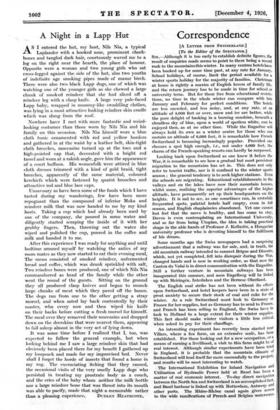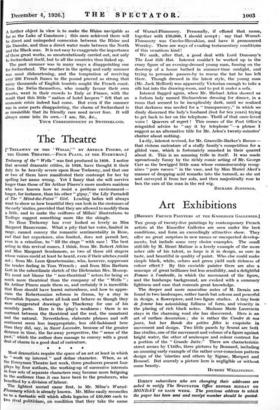Correspondence
[A LETTER FROM SWITZERLAND.] [To the Editor of the SPECTATOR.] Sin,—Although it is too early to establish definite figures, the result of enquiries made seems to point to there being a record rush to the mountains this winter. In many centres hotels have been booked up for some time past, at any rate for January. School holidays, of course, limit the period available for a winter sports holiday for the majority of families. Christmas at home is rightly a maxim of English lovers of family life, and the return journey has to be made in time for school or university term. But for those free from educational restric- tions, no time in the whole winter can compare with late January and February for perfect conditions. The hotels are less crowded, and less noisy, and, at any rate, at an altitude of 4,000 feet or over, snow and ice are better, while the pure delight of basking in a burning sunshine, beneath a cloudless sky of blue, upon a world of spotless white, can be enjoyed then, as at no other time. While the Engadine will always hold its own as a winter centre for those who can sustain an altitude of 6,000 feet, it is remarkable how French Switzerland is becoming increasingly popular. Provided one chooses a spot high enough, i.e., not under 4,000 feet, the charm of the French-speaking resorts can hardly be surpassed.
Looking back upon Switzerland as one knew it before the War, it is remarkable to see how a gradual but most persistent migration to the mountains has set in. This does not only refer to tourist traffic, nor is it confined to the winter sports season ; the general tendency is to,seek higher stations. Even the schools are migrating. Educational establishments in the valleys and on the lakes have now their mountain houses, whilst some, realizing the superior advantages of the higher altitude, have permanently set up their headquarters on the heights. It is sad to see, as one sometimes can, in erstwhile frequented spots, palatial hotels half empty, even in full season, and English chaplaincies abandoned. Yet one cannot but feel that the move is healthy, and has come to stay, Davos is even contemplating an International University, and so far from being Utopian, the idea is- taking practical shape in the able hands of Professor J. Kollaritz, a Hungarian university professor who is devoting himself to the fulfilment of his dream.
Some months ago the Swiss newspapers had a surprising advertisement that a railway was for sale, and, in truth, the old mountain railway intended to connect Brigue and Disentis, which, not yet completed, fell into disrepair during the War, changed hands and is now in working order, so that now the Canton -du Valai is in direct communication with the Engadine. Still a further venture in mountain railways has been inaugurated this summer, and soon Engelberg will be linked, up with Meiringen, Interlaken and the Bernese Oberland.
The English coal strike has not been without its effects upon Switzerland, and hotel keepers have been in a state of great anxiety to secure their stock of coal and coke for the, winter. As a rule Switzerland must look to Germany or France for her supplies, but as Germany has to send to France, and Franch has been selling to England, the Swiss have to look to Holland to a large extent for their winter supplies. This fact should make winter visitors a little less critical, when asked to pay for their chauffage.
An interesting experiment has recently been started near Villars, where a fox farm, on an extensive scale, has been established. For those looking out for a new occupation, or s means of earning a livelihood, a visit to this farm might be of real interest. Although similar experiments have been tried in England, it is probable that the mountain climate of Switzerland will lend itself far more successfully to the projects, and results will be most interesting to watch.
The International Exhibition for Inland Navigation and Utilization of Hydraulic Power held at Basel has been a matter of real economic interest. To-day direct navigation between the North Sea and Switzerland is an accomplished fact, and Basel harbour is linked up with Rotterdam, Antwerp and other ports. The Rhine-Rhone canal again gives access to the wide ramifications of French -and Belgian watervsYs. A further object in view is to make the Rhine navigable as. far as the Lake of Constance this once achieved there will be direct and unimpeded connexion between the Rhine and the Danube, and thus a direct water route between the North and the Black seas. It is not easy to exaggerate the importance of these great works, so unostentatiously carried out, not only to Switzerland itself, but to all the countries thus linked tip.
The past :summer was in many ways a disappointing one for Switzerland. . The weather in the spring and 'early 'summer was most disheartening, and the temptation of receiving over 200 French francs to the pound proved so strong that many thousands of English tourists sought the French coast. Even the Silks themselves, who usually favour their own resorts, went in their crowds to Italy or France, with the result that this little "nation of hotel keepers " felt that an economic crisis indeed had come: But even if the summer was in some parts disappointing, the charm of Switzerland is so irresistible that its friendly race need never fear. It will always come into its own.—I am, Sir, &c.,
YOUR CORRESPONDENT IN SWITZERLAND.































































 Previous page
Previous page